Katie Britt and four AL House members sign letter opposing EPA emissions mandates

U.S. Senator Katie Britt joined Representatives Barry Moore, Gary Palmer, Jerry Carl, and Robert Aderholt, joined more than 150 of their colleagues, in a bicameral letter to U.S. Environmental Protection Agency (EPA) Administrator Michael Regan urging the Biden Administration to overturn its de facto electric mandate on trucks, tractors, buses, and semis. The final rule, “Greenhouse Gas Emissions Standards for Heavy-Duty Vehicles – Phase 3,” was published on April 22, 2024. According to the Rule Summary on EPA website, “The new standards will be applicable to HD vocational vehicles (such as delivery trucks, refuse haulers, public utility trucks, transit, shuttle, school buses, etc.) and tractors (such as day cabs and sleeper cabs on tractor-trailer trucks).” Numerous consumer and trade groups oppose the rule. The American Trucking Associations Chief Advocacy and Public Affairs Officer Ed Gilroy said, “The American Trucking Associations opposes EPA’s GHG3 rule in its current form because the post-2030 targets remain entirely unachievable given the current state of zero-emission technology, the lack of charging infrastructure and restrictions on the power grid.” The bicameral letter warned, “This rule will harm our families and businesses, increases our gas prices, and makes us more dependent on foreign supply chains – particularly China.” “Our farmers and agricultural industry will be especially hurt by this new mandate. According to the latest agriculture census by the U.S. Department of Agriculture, there are 3,161,820 trucks (including pickups) on over 1.4 million farms and 3,784,743 tractors on over 1.5 million farms that would see higher equipment costs and tighter margins due to this misguided rule. These numbers also do not account for the small, independent truckers, trucking companies, and truck dealerships throughout the U.S. that will be impacted. Not only would this rule harm consumers, but it would also exacerbate consolidation by effectively forcing our small trucking companies out of business that cannot afford this hasty transition to electric or hydrogen powered trucks,” the lawmakers wrote. “[W]e urge you to withdraw your final rule that is both unrealistic and burdensome,” the lawmakers continued. “This rule will only further increase costs for American families, businesses, and rural communities while fueling more inflation. We need to give Americans a choice in the cars and trucks that they drive, and affordability and performance for the trucking industry is paramount.” Britt’s office released a statement calling her a “strong proponent of preserving consumers’ freedom to choose gas-powered vehicles.” Earlier this year, Britt joined Senator Tommy Tuberville and another large bicameral group of lawmakers in a letter calling for the National Highway Traffic Safety Administration (NHTSA) Deputy Administrator to rescind the Biden Administration’s proposed Corporate Average Fuel Economy (CAFE) standards for passenger cars and light-duty trucks. This rule sought to phase out gas-powered vehicles and mandate the mass production of electric vehicles. Britt’s statement noted that she has cosponsored several bills addressing the Biden administration’s vehicle mandates including Senator Crapo’s Choice in Automobile Retail Sales (CARS) Act to prohibit the EPA from moving forward with its EV mandate for passenger cars and trucks or any similar future rules that would limit the availability of new motor vehicles based on that vehicle’s engine type as well as being a cosponsor of Senator Markwayne Mullin’s the Preserving Choice in Vehicle Purchases Act.
Barry Moore lone delegation vote against NDAA continues to highlight spending bills flaws
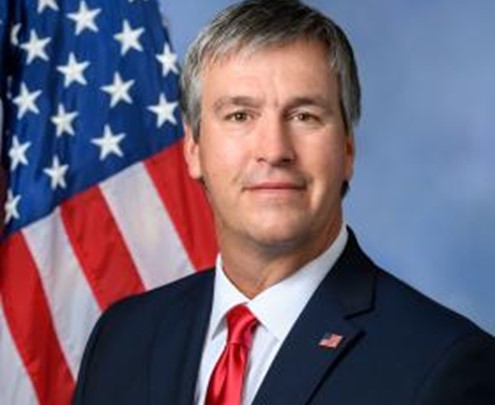
Last week, the House of Representatives passed a bipartisan conference report to the National Defense Authorization Act (NDAA) for Fiscal Year 2024. The final report, which sets policy for the U.S. military, left out several partisan Republican agenda items that were added by Republicans to the NDAA on the House floor in the House version of the bill in July, igniting a months-long partisan impasse with the White House, and the Democratic-controlled U.S. Senate. Thursday’s compromise version of the NDAA sets Defense policy for the year that began on October 1. Congressman Barry Moore said those conservative priorities were needed to refocus our Department of Defense solely on its mission to safeguard our national security; thus voting against the bipartisan NDAA that passed the House. Moore has subsequently tweeted for specifics about his opposition since it passed. “This version of the NDAA forces American taxpayers to fund abortion travel, sex reassignment surgeries, a one-year reauthorization of FISA with no reforms, which allows weaponized government to spy on Americans, and critical race theory initiatives teaching that our nation’s enemies are not abroad, but within our own citizens and military,” said Moore. “Earlier this year, I proudly supported the House version of this legislation, which was truly focused on military readiness and service member needs. I am disappointed that divisive policies which hold service members and taxpayers hostage to the Democrats’ radical agenda have been included in this bill, and I cannot support it.” According to Moore the FY24 conference report to the NDAA includes the following: Funding for abortion travel for service members Funding for sex re-assignment surgeries for service members Funding to teach service members CRT and DEI initiatives An automatic one-year reauthorization of FISA with no reforms, allowing for continued weaponized government through April 2025 Only watered down efforts to deter the growing influence and military capabilities of China Provides at least $600 million in funding to Ukraine Climate change initiative funding to appease Biden’s wealthy radical environmentalist base Democrats have functional control of the Senate, the largest minority in the history of the House of Representatives, and total control of the executive branch so some compromise was necessary to effectively govern. The NDAA allows the Biden Administration to continue using taxpayer funds on abortion travel, transgender surgeries, and drag shows. How does that prepare our service members to combat adversaries like China and Russia? — Rep. Barry Moore (@RepBarryMoore) December 15, 2023 Congressman Robert Aderholt (R-AL04) voted for the compromise version of the legislation, acknowledging that he would have preferred a more partisan GOP bill. “Despite our many policy wins, the reality of a divided government means that Republicans did not get everything we wanted,” Aderholt stated. ”I am deeply disappointed that Senate Democrats were able to strip out of a House-passed provision that would overturn President Biden’s unconstitutional policy of reimbursing servicemembers’ abortion travel costs. However, we were able to take an axe to the leftist, woke agenda that Democrats have been forcing on our military. We have put a hiring freeze for social justice warriors in the DoD, prohibited the use of federal funds to promote critical race theory, and undone the injustice done to our servicemembers who were wrongfully punished for refusing the COVID-19 vaccine.” I am disappointed that divisive policies which hold service members and taxpayers hostage to the Democrats’ radical agenda have been included in the National Defense Authorization Act, and I cannot support it. See my full statement below: pic.twitter.com/RIV36ee1AE — Rep. Barry Moore (@RepBarryMoore) December 14, 2023 This year’s NDAA reauthorizes FISA 702 spying authority with no reforms. This means that our intelligence community can continue to conduct warrantless surveillance campaigns on Americans without penalty, including Biden’s political opponents like President Trump. — Rep. Barry Moore (@RepBarryMoore) December 16, 2023 The bipartisan version of the NDAA passed the House in a 310 to 118 vote. 45 Democrats and 73 Republicans voted against the final version of the NDAA. The NDAA overcame opposition from both hard-line conservative Freedom Caucus members as well as progressives who thought that Democratic leadership compromised too much. The NDAA authorizes $886 million for defense in FY2024 including a substantial increase in the amount of money that the U.S. spends on nuclear weapons as well as a 5.2% across the board pay increase for troops. This version of the NDAA has already passed the U.S. Senate, with Senators Katie Britt and Tommy Tuberville voting in favor of the measure. “I voted for this year’s defense bill for two reasons: because it’s good for Alabama and it’s good for our national security,” said Sen. Tuberville. “This bill could have been a lot stronger, but Chuck Schumer rigged the negotiation process to prevent conservatives from getting key wins on issues like taxpayer-funded abortion and DEI. We didn’t get everything we wanted this time, but we got a lot. And my fellow conservatives in Alabama and across America can be sure that I’m determined to get the rest of it in next year’s bill.” Moore is running for a third term against incumbent Congressman Jerry Carl who voted for the NDAA. The two GOP incumbents were placed in the same congressional district by a federal court to settle a Voting Rights Act complaint against the state and will face Republican primary voters on March 5, 2024. To connect with the author of this story or to comment, email brandonmreporter@gmail.com
Jerry Carl wants to make America energy-independent
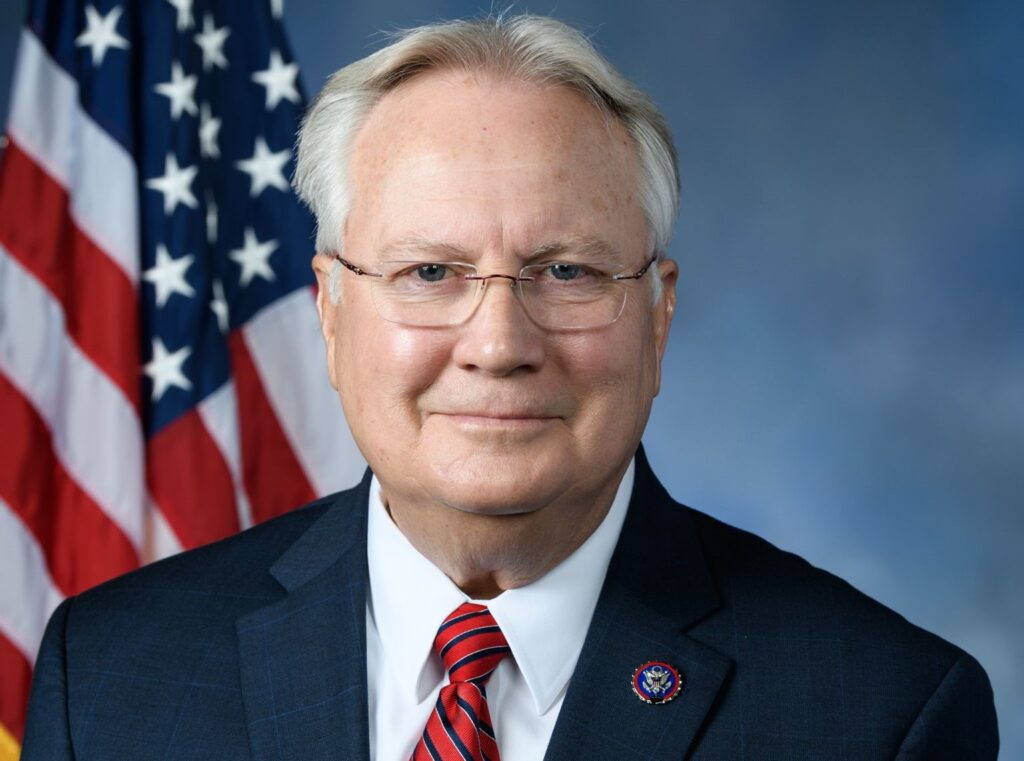
Congressman Jerry Carl (R-AL01) said, “Environmental groups are really, really working with the President to get things shut down.” Carl commented during an interview with Champions of Rural America on the RFD-TV network. Carl warned that our energy industry will feel the impact of President Joe Biden’s (D) energy policies for ten years. “So what we are seeing in production in America, it’s slowing up,” Carl said. “We are just beginning to see it. It is far from over. It will be ten years before we feel the full impact of it.” President Biden’s anti-American energy policies are a direct opposite approach from President Donald Trump’s (R) pro-energy policies. “That’s really the dangerous part about government,” Rep. Carl said. “We can’t take an industry, and every time we change a president, either encourage it to run or encourage it to shut down.” Carl said that higher fuel prices hit American farmers particularly hard. “And fuel prices – people think, well, it didn’t go up but 50 cents a gallon, but to a farmer running multiple tractors, that is a huge amount of money that is being burned up.” Carl blamed the Biden administration. “It goes back to this administration,” Carl said. “They do not want new production of anything carbon-related. Until we can change the environment attitude of government as a whole and how we deal with energy, we’re in trouble.” Carl said the result, in addition to the higher fuel prices, is that the U.S. is importing more oil from Venezuela. “This Venezuelan oil that’s being brought in. It’s not our own oil,” Carl said. “It is actually Venezuelan. So when you fill your car up, think about the communist country that we are supporting. That is unfair to we, the Americans. I want to be energy-independent. This country wants to be energy independent. The environmental groups they wouldn’t have a problem with importing Venezuelan oil. The nastiest oil known to man. It is just horrible. We have got the cleanest that can be produced. It is produced right there in the Gulf and several places within the continental United States.” “The environmental groups are really, really working with the President to get things shut down,” Carl warned. Carl says the oil industry does more for the community than just providing jobs and energy. “The oil industry as a whole does so much for just the community,” Carl said. “They have a self-imposed tax that is called GOMESA. That is a tax dollar we get in Mobile, for example. In 2020, we got $26 million from that tax that’s imposed on them. We use that $26 million in the Gulf Coast region for environmental projects. We did a huge restoration of grass fields. It is all earmarked for environmental projects.” Carl has represented Alabama’s First Congressional District since 2020. To connect with the author of this story or to comment, email brandonmreporter@gmail.com.
Republican CD2 candidate Wallace Gilberry says he learned life lessons from playing football

Republican Second Congressional District (CD2) candidate Wallace Gilberry is reminding voters of his success playing football for the University of Alabama and in the National Football League. “I cut my teeth on the gridiron in Tuscaloosa,” Gilberry said in a recent fundraising email. “I played for Mike Shula and Nick Saban, then made it 9 seasons in the NFL.” “Football – along with my mom and great-grandmother – taught me everything I know,” Gilberry continued. “Like: 1) Bring glory to God on and off the field 2) Play through the whistle 3) Always stand to honor those who keep us free” “My name is Wallace Gilberry,” Gilberry stated. “If you’ve never heard of me, that’s OK – here’s what you should know: I’m a Black man in America who is familiar with the struggles of our community. But I’m also a Republican who voted for Trump. And I’m running in the single most competitive House race in the entire country.” Democrats are hoping that they can flip Alabama’s Second Congressional District from Republican to Democratic after the federal courts redrew the district to make Congressional District 2 48.7 percent Black. Twenty-one candidates, including Gilberry, have qualified to run for the seat. Second District incumbent Congressman Barry Moore was redistricted to Congressional District 1 where he is challenging incumbent Congressman Jerry Carl in the GOP primary. “I’m running against more than a DOZEN far-left Democrats with an army of mega-donors backing them.,” Gilberry said. “I’ve never run for office. They have. I’ve never even sent an email like this before. But I was raised by a single mom who worked 2 jobs to put food on the table for her 5 kids – being an underdog is nothing new to me or my family. So – with grit and determination in my heart – I’m respectfully asking you to pitch in JUST a few bucks now to fuel my underdog campaign to victory. I promise I’ll make you proud when we win it all. God bless you.” Gilberry is a native of Bay Minette in Baldwin County. He grew up as one of five children and was raised by his single mom and his great-grandmother. Gilberry is one of eight Republicans who have qualified for the March 5 primary ballot. State Senator Greg Albritton, former state Senator Dick Brewbaker, real estate attorney Caroleene Dobson, former Congressional staffer turned Mobile restauranteur Karla M. DuPriest, attorney and real estate broker Hampton S. Harris, Stacey T. Shepperson, and Newton city council member Belinda Thomas are the other seven GOP candidates. Thirteen Democrats have qualified to run as well. The eventual Republican and Democratic nominees will face off in the general election on November 5. To connect with the author of this story or to comment, email brandonmreporter@gmail.com.
Holidays can be a stressful time of the year

We all have that relative who insists on loudly expressing their political views at the Thanksgiving table and picking on anyone who dares dispute them. Some people have not gotten over perceived or actual transgressions from years past and never miss an opportunity to rehash what went wrong then – even if that was decades ago. There are stressors in every family, and the holidays can be pretty stressful, even in the best of times. These, however, are not the best of times. Psychologists warn that these holidays may be among the most stressful we have experienced recently. Part of the issue is inflation and economic affairs. Anybody who wants to work is working. Wages are up, but nobody under 50 remembers three straight years of inflation this bad. Interest rates have not been this high in a long time, and the stress on people to pay their monthly bills is starting to grow. There are homes across this country that put that Thanksgiving meal on a credit card and are wondering how they will pay the bills for this. How are they going to pay for Christmas? The typical Thanksgiving meal has never been costlier. U.S. Senator Tommy Tuberville (R-Alabama) said Monday on X that the cost of the Thanksgiving meal is 25% higher than it was in 2019. “Americans will pay 25% more for their Thanksgiving dinner than in 2019. Bidenomics continues to devastate our hardworking citizens, especially during the holidays,” Tuberville stated. Congressman Jerry Carl (R-AL01) said, “This year will be the most expensive Thanksgiving in history thanks to Bidenomics. Turkey prices are up 7.2%. Sugar prices are up 8.8% Frozen vegetable prices are up 10.7%.” The economics of the moment are what they are, but foreign affairs are weighing on the minds of many Americans. The United States is technically not at war; this is only the second year since 2020 where that was the case, but this certainly does not feel like peace either. The drums of war have not been louder in most of our lifetimes. Our support for Ukraine has cost us billions of dollars, and those costs are rapidly climbing. Taiwan is building its armed forces up for a likely confrontation with China. Israel is asking for more U.S. military aid in its existential war with Hamas and Hezbollah. It is not going to be a peaceful Christmas for American troops deployed in the Middle East, where Iranian-backed militants are launching increasingly more intense attacks on those American troops. The Pentagon announced that the fourth round of American retaliatory air strikes have followed. Sen. Tuberville is warning that U.S. munitions stockpiles are rapidly depleting, and arms makers can’t keep up with the demand. As tensions rise between the U.S. and Russia, China, Iran, and North Korea, World War III is being discussed as a possibility in some circles, and it is affecting people’s stress levels. JP Morgan Chase CEO Jamie Dimon said recently, “This may be the most dangerous time this world has seen in decades.” It is a real possibility, particularly in military families or families with teens and twentysomethings, that this might be one of the last Thanksgivings for a while where someone is not deployed somewhere fighting for the American way of life. Psychologists warn that you should be aware that other family members and friends may be stressing over these issues. While the readers of Alabama Today are well-informed – others are not as keenly aware of what perilous times we may be living in. The Thanksgiving dinner table and family gatherings over the holiday might not be the best of times to discuss any of this, especially knowing that some people may already be stressed about the situation. To connect with the author of this story or to comment, email brandonmreporter@gmail.com.
Carl, Tuberville, and Britt offer condolences for Rosalynn Carter

On Sunday, the Carter Center announced that former First Lady Rosalynn Carter had died. She was 96. Congressman Jerry Carl (R-AL01) said on the social media site X: “Tina and I are thinking of and praying for President Jimmy Carter, plus the many family and friends of First Lady Rosalynn Carter. May she rest in peace.” U.S. Senator Tommy Tuberville (R-Alabama) said on X: “First Lady Rosalynn Carter dedicated her life to service – particularly as a mental health advocate. Much of her work shapes how we address today’s mental health crisis. My prayers go out to President Carter and the Carter family.” U.S. Senator Katie Britt (R-Alabama) said on X: “Rosalynn Carter lived an incredible life that was wholeheartedly devoted to serving others. She leaves behind a legacy of grace, grit, and goodwill. Our thoughts and prayers are with President Carter and their loved ones.” She is survived by former President Jimmy Carter. President Carter served as President from 1977 to 1981. Carter, at age 99, is the longest-lived President in American history. The former President has been in hospice care for the past several months. President Joe Biden and First Lady Jill Biden released a statement on the Passing of Former First Lady Rosalynn Carter. “First Lady Rosalynn Carter walked her own path, inspiring a nation and the world along the way,” the Bidens wrote. “Throughout her incredible life as First Lady of Georgia and the First Lady of the United States, Rosalynn did so much to address many of society’s greatest needs. She was a champion for equal rights and opportunities for women and girls; an advocate for mental health and wellness for every person; and a supporter of the often unseen and uncompensated caregivers of our children, aging loved ones, and people with disabilities.” “Above all, the deep love shared between Jimmy and Rosalynn Carter is the definition of partnership, and their humble leadership is the definition of patriotism,” the Bidens continued. “She lived her life by her faith. Time and time again, during the more than four decades of our friendship – through rigors of campaigns, through the darkness of deep and profound loss – we always felt the hope, warmth, and optimism of Rosalynn Carter. She will always be in our hearts. On behalf of a grateful nation, we send our love to President Carter, the entire Carter family, and the countless people across our nation and the world whose lives are better, fuller, and brighter because of the life and legacy of Rosalynn Carter. May God bless our dear friend. May God bless a great American.” To connect with the author of this story or to comment, email brandonmreporter@gmail.com.
Tom Holmes running for Congressional District 1

The court-appointed special master that redrew Alabama’s Congressional Districts made the Congressional District 1 (CD1) much more conservative, White, and Republican-friendly in order to make the Second Congressional District (CD2) winnable for minority voters. This redistricting in CD1 has not deterred Mobile Democrat Tom Holmes, who has qualified to run for Congress in the district anyway. Holmes is a licensed lay preacher with the Episcopal Diocese of Central Gulf Coast. He is also a volunteer Board President at The Arc of Mobile County. Tom Holmes is a United States Navy Veteran who served during the Vietnam War era. He attends and is an active member of Trinity Episcopal Church. During his career, Holmes was the Chief of Science and Technology Section for the Alabama Department of Economic and Community Affairs (ADECA) from 1996-2001. He was a planning/economic development specialist for ADECA from 1979-1996. He was previously the director of the Area Agency on Aging for the Birmingham Regional Planning Commission from 1975-1979. He also worked for the Mobile County Probate Court as a personnel development specialist for the Anniston and Area Agency on Aging. He is also a former teacher at both Dunbar Junior High School and Murphy High School. Holmes is actively involved in his community, including the Cottage Hill Civitan Club in Mobile, The Arc of Alabama, Boy Scouts of America, Alabama Council on Developmental Disabilities, National Eagle Scout Association, and Alpha Phi Omega National Service Fraternity. Holmes has a master’s degree in public administration from Jacksonville State University and a bachelor’s degree in political science from the University of Mobile. Holmes was the Democratic nominee for Alabama State Board of Education, District 1 in 2020, where he lost to Republican Jackie Zeigler. He was also the Democratic nominee for Alabama State Senate, District 35 in 2018 where he lost to Republican David Sessions. Holmes was the only Democrat to qualify, so he is effectively the Democratic nominee for CD1. He will face the winner of the March 5 Republican primary in the general election on November 5. Incumbent Congressman Jerry Carl (R-AL01) faces Congressman Barry Moore (R-AL02) after Alabama’s congressional districts were redrawn by a court-appointed special master. Moore and his native Coffee County were redistricted into CD1. Most of the City of Mobile and the northernmost counties of CD1 were redistricted into CD2. In exchange, CD1 picked up the southern half of the wiregrass, including Enterprise and most of Dothan stretching along the Florida line all the way to the Georgia state line. To connect with the author of this story or to comment, email brandonmreporter@gmail.com.
Congressional candidate Caroleene Dobson promises to limit Tik Tok influence and prevent social media companies from silencing conservative voices

On Thursday, Congressional candidate Caroleene Dobson released a statement promising that she will lead efforts to block the influence of the Chinese-owned TikTok video app and prevent social media conglomerates from silencing conservatives on their platforms if elected to Congress. Dobson, a Montgomery real estate attorney, is a Republican candidate for Alabama’s Second Congressional District seat. “As relations between China and the U.S. continue to erode and every expert agrees that cyber warfare is a real and looming threat, more than 150 million Americans have willingly surrendered their personal information to the Chinese-owned TikTok video app,” Dobson said. “At the same time, those who express opinions contrary to woke ideas and liberal dogma on their social media pages are routinely sent to ‘Facebook jail’ or have their accounts permanently revoked like President [Donald] Trump.” “When social media owners can silence a president and shadow ban all conservative thought with which they disagree, they assume the powers of Third World, Banana Republic dictators,” Dobson continued. “And when the Chinese Communist Party can access the personal information of millions of Americans at any time they wish, we are allowing them to weaponize the internet and placing their fingers upon the trigger.” Dobson promised that she would join the ever-growing number of congressional conservatives who are sponsoring legislation and promoting ideas that will stem the control of social media by the Chinese government and extremist liberal interests. Dobson noted that TikTok is owned by Beijing-based ByteDance Ltd. and is by law obligated under China’s “National Intelligence Law” to turn over any information on its American users that is demanded by the ruling Communist Party. During a congressional hearing held earlier this year, the chief executive officer of TikTok also deflected questions about Community Party ties and influence within the company. Dobson pointed to an internal company post by a senior Facebook engineer as evidence of the almost universal liberal domination of the popular social media platform and the contempt that conservative beliefs generate. The post, which was reported by the New York Times, read: “We are a political monoculture that’s intolerant of different views. We claim to welcome all perspectives but are quick to attack — often in mobs — anyone who presents a view that appears to be in opposition to left-leaning ideology.” Dobson has a bachelor’s degree from Harvard and a law degree from the Baylor School of Law. She is married and has two children. She serves on the Alabama Forestry Commission and the Southeast Livestock Exposition and is a member of the Birmingham Chapter of the Federalist Society. Dobson grew up on a cattle farm in Alabama and excelled in high school rodeo. Congressional District 2 has been heavily redrawn ahead of this election. Previously, CD2 was 28% Black. The court-appointed special master redrew Congressional District 2 so that it is now 48.7% Black. It includes all of Montgomery County, the eastern half of the Blackbelt, the northern half of the Wiregrass, and part of Alabama southwest, including most of the City of Mobile. According to data prepared by the special master, there is over a 94% likelihood that a Democrat will win the district. The special master redistricted Second Congressional District incumbent Rep. Barry Moore (R-Enterprise) and all of Coffee County out of Congressional District 2 and into Congressional District 1. Moore is challenging incumbent Jerry Carl (R-Mobile) in the First District, so Congressional District 2 is a rare open seat. State Senator Greg Albritton of Atmore, former State Senator Dick Brewbaker, real estate broker attorney Hampton Harris, former Congressional staffer and restauranteur Karla M. DuPriest, football star Wallace Gilberry, Stacey T. Shepperson, and Belinda Thomas are all also running in the Republican primary. The major party primaries are on March 5. If necessary. There will be a Republican primary runoff election on April 16. Thirteen Democrats are running in the Democratic primary. The Republican and Democratic nominees will face off on the November 5 presidential election ballot. To connect with the author of this story or to comment, email brandonmreporter@gmail.com.
U.S. House passes stopgap spending bill in bipartisan vote, in crucial test for new speaker
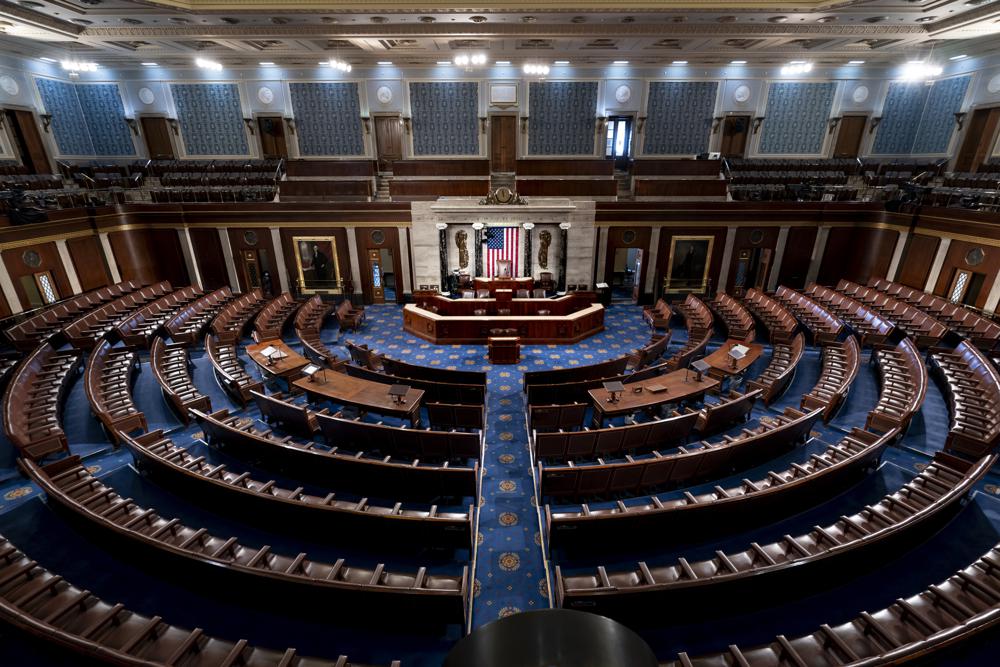
Jennifer Shutt, Alabama Reflector WASHINGTON — The U.S. House took a broadly bipartisan vote Tuesday to fund the government into the new year, though the measure must pass the Senate by the end of the week if Congress is going to avoid a partial government shutdown. The 336-95 House vote was the first major legislative test for Speaker Mike Johnson, the Louisiana Republican who took on the role after the former speaker was ousted after passing a similar bipartisan short-term funding bill in late September. A total of 93 House Republicans voted against the bill, but enough Democrats supported it to send the measure to the Senate. In the Alabama delegation, U.S. Reps. Robert Aderholt, R-Haleyville; Terri Sewell, D-Birmingham, and Dale Strong, R-Madison, voted for the bill. U.S. Reps. Jerry Carl, R-Mobile; Barry Moore, R-Enterprise; Gary Palmer, R-Hoover and Mike Rogers, R-Saks, voted against it. Senate Majority Leader Chuck Schumer, a New York Democrat, said Tuesday that he and Minority Leader Mitch McConnell, a Kentucky Republican, both agree the Senate needs to pass the bill quickly to avoid a funding lapse. “If the House should pass it, and I hope they do, Leader McConnell and I will figure out the best way to get this done quickly,” Schumer said. During a press conference prior to the vote, Johnson defended his decision to move the short-term spending bill, saying it would prevent Congress from passing an omnibus spending package in mid-December before the holiday break. Republicans have repeatedly said they oppose such massive packages, which wrap together all 12 government spending bills, often on short notice. He rejected criticism from fellow GOP lawmakers that he was making a mistake and taking the wrong approach to funding the government. “We’re not surrendering, we’re fighting. But you have to be wise about choosing the fights,” Johnson said. “You’ve got to fight fights that you can win, and we’re going to, and you’re going to see this House majority stand together on our principles.” Johnson said he was optimistic that Congress would be able to pass the dozen full-year appropriations bills before the new deadlines next year, avoiding the need for another stopgap spending bill. “Part of the reason I’m confident about this is, I’ve been drinking from Niagara Falls for the last three weeks. This will allow everybody to go home for a couple of days for Thanksgiving,” Johnson said. “Everybody can cool off.” During that time, Johnson said he would get a group together to “map out that plan to fight for” conservative principles in the final set of 12 spending bills. The current fiscal year ends on September 30, 2024. “I look forward to rolling that out,” he said. “You’ll see much more of that.” Two deadlines The 32-page short-term spending bill, sometimes called a continuing resolution or CR, would fund part of the federal government through January 19 and the remainder of the annual appropriations bills through February 2. The short-term funding measure is intended to give Congress and the White House more time to negotiate the dozen full-year spending bills. But there are several pitfalls along the way. Former GOP Speaker Kevin McCarthy was ousted from his leadership role after moving the short-term government funding bill in late September that will keep the federal government up and running through Friday. The decision by eight House Republicans and Democrats to vote to “vacate the chair” plunged the chamber into gridlock for weeks as GOP lawmakers debated who should lead the party. After nominating three Republicans who couldn’t get the votes on the floor to hold the gavel, the party finally coalesced behind Johnson. But some of the especially conservative members became frustrated this week with his decision to put the stopgap spending bill on the floor. The short-term spending bill would give the House and Senate until January 19 to work out an agreement on the Agriculture-FDA, Energy-Water, Military Construction-VA, and Transportation-HUD spending bills. The remaining eight spending bills — Commerce-Justice-Science, Defense, Financial Services, Homeland Security, Interior-Environment, Labor-HHS-Education, Legislative Branch, and State-Foreign Operations — would have funding until February 2. The House and Senate would need to reach an agreement well before those deadlines on the total amount of spending for the current fiscal year that began back on October 1. The leaders of the Appropriations committees would then determine how much of the money goes to each of the dozen bills. Democrats have said the total spending level should match what Congress and President Joe Biden agreed to in the debt limit law this summer. But some Republicans have pressed for lawmakers to go below that level. Lawmakers sound off on spending Idaho Republican Rep. Mike Simpson, chair of the Interior-Environment spending panel, said that leaders need to clarify the total spending number, though he expects that will ultimately match the debt limit law. “I think it will end up being that, but leadership needs to tell us,” Simpson said. Georgia Rep. Sanford Bishop Jr., the top Democrat on the Agriculture spending panel, said the total spending level for the final slate of bills that the House and Senate will negotiate in the coming weeks and months needs to adhere to the number in the debt limit law. “Some of them, particularly the MAGA Republicans, pretty much don’t agree with it. They want to cut much more drastically than is beneficial for the American people,” Bishop said. “The moderate, reasonable minds of that side think that we probably should do something that is reasonable.” Maryland Rep. Steny Hoyer, the top Democrat on the Financial Services spending panel, said a key challenge to getting full-year bills agreed to is that “Republicans have been unable for eight or nine months to get their act together on fiscal issues.” “And we’d lost a speaker over that,” Hoyer said. “They were unable to elect speakers for some period of time, and there is still no guarantee that we know what the overall spending levels are.” Ohio Democratic Rep. Marcy Kaptur, ranking member
Jerry Carl and Barry Moore support failed impeachment of Homeland Security Secretary Alejandro Mayorkas
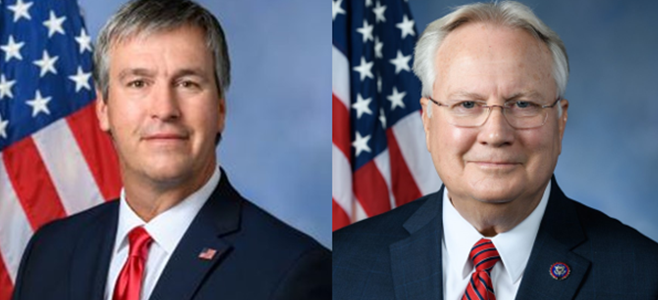
On Tuesday night, the U.S. House of Representatives voted to thwart a motion by Congresswoman Marjorie Taylor Greene (R-Georgia) to impeach embattled Homeland Security Secretary Alejandro Mayorkas. Eight Republicans joined House Democrats to stop the impeachment effort and instead refer the motion to the Homeland Security Committee for their consideration. The eight Republicans were Representatives Ken Buck (R-Colorado), Darrell Issa (R-California), Tom McClintock (R-California), Patrick McHenry (R-North Carolina), John Duarte (R-California), Virginia Foxx (R-North Carolina), Cliff Bentz (R-Oregan), and Mike Turner (R-Ohio). All six of Alabama’s Republican Congressmen voted with Rep. Greene to proceed with impeaching Mayokas. Congressman Jerry Carl (R-AL01) wrote on X, “Tonight, the House voted on a motion to refer this impeachment resolution to the Homeland Security Committee. This motion passed, so we didn’t vote to impeach him. I voted against this motion because the House needs to take immediate action to impeach Secretary Mayorkas.” Rep. Barry Moore (AL-02) also voted against killing the resolution to begin impeachment proceedings against Homeland Security Secretary Mayorkas. Rep. Moore is also a co-sponsor of this resolution. Moore was one of the first Members of Congress to call for the impeachment of Mayorkas back in May. “Under Mayorkas’ watch, there have been 8 million illegal border encounters, 52,900 pounds of fentanyl seized at the border, more than 280 people on terrorist watchlists caught while attempting to cross the border, and 1.8 million known “got aways” who have evaded U.S. authorities,” said Moore. “In the private sector, if you don’t do your job, you get fired. Mayorkas’ failure to do his job is putting Americans in grave danger every day, and it’s past time for him to be impeached.” Carl is also a co-sponsor of Rep. Greene’s resolution. “Our southern border is wide open, and we have an unprecedented illegal immigration crisis at our southern border because Secretary Mayorkas has failed to do his job. That’s why I proudly co-sponsored @RepMTG’s resolution to impeach him.” Carl said on X. Americans for Legal Immigration PAC (ALIPAC.us) announced afterward that it is dropping the national organization’s long-standing endorsement and support for Rep. Tom McClintock after McClintock joined seven other Republicans in voting with Democrats to protect Mayorkas from impeachment. “Our decade-long support for Rep. McClintock ends today, and we call on American patriots, conservatives, Republicans, and invasion opponents to mount GOP Primary challengers to any of these eight sellouts still on the ballot in 2024,” said William Gheen of ALIPAC. “These Republicans supporting Democrat efforts to flood and overwhelm U.S. elections with illegal alien Democrat voters should be run out of office! Shame on them for depriving all Americans of a true choice against illegal globalist policies.” Rep. Marjorie Taylor Greene said that she will continue her efforts to hold the Biden Administration accountable for its thwarting of the nation’s immigration laws and the crisis on the southern border. “I will not stop fighting to hold the Biden administration accountable for their open border policies that are killing Americans every day,” Congresswoman Greene said on X. “It’s time for Republicans to grow a spine and join me in impeaching Mayorkas and others who are destroying our country.” An impeachment by the House had it occurred would likely have been rejected by the Democratic-controlled U.S. Senate if the Senate even took the matter up. To connect with the author of this story or to comment, email brandonmreporter@gmail.com.
21 candidates qualify to run in Congressional District 2

Alabama’s Second Congressional District race was already crowded, but by the time major party qualifying ended on Friday at 5:00 p.m., a total of 21 candidates had qualified with the Alabama Democratic Party and the Alabama Republican Party. The Congressional District 2 (CD2) seat is an open seat because the court-appointed special master redrew Alabama’s congressional districts in such a way that two incumbents, Barry Moore (R-Enterprise) and Jerry Carl (R-Enterprise), now live in the same district – Alabama’s First Congressional District. While Moore and Carl battle over which one gets to remain in Congress, CD2 is open with no incumbent. Since the rules for Congressional Districts do not require you to live in the district you are running, politicians from all over Alabama are running for this seat. Thirteen candidates qualified to run in CD2 with the Alabama Democratic Party. Retired Marine and 2020 congressional candidate James Averhart from Mobile qualified. So did State Representative Napoleon Bracy Jr. Bracy represents Prichard. He works for Austal. State Senator Merika Coleman from Jefferson County qualified. Coleman represents Birmingham, Bessemer, and Pleasant Grove. State Representative Anthony Daniels from Huntsville is running for the seat. Daniels is the House Minority Leader. Shomari Figures works in Washington, D.C., for Attorney General Merrick Garland but is originally from Mobile. His parents are State Senator Vivian Figures and the late State Senator Michael Figures (both of Mobile). He has worked for President Barack Obama. Brian Gary is a general surgeon at Jackson Hospital. State Representative Juandalynn Givan represents Birmingham and Forestdale in Jefferson County. Givan is a Jefferson County attorney. State Representative Jeremy Gray represents Lee and Russell Counties in the Legislature. He is the House Minority Whip. Phyllis Harvey-Hall was the Democratic nominee for CD2 in 2022 and 2020. She lost both times to Barry Moore. Willie J. Lenard is a resident of Opelika. Vimal Patel is a successful hotelier, commercial real estate investor, and realtor. He was a candidate in the Democratic primary in 2022 but lost to Harvey-Hall. Larry Darnell Simpson is a musician. Darryl “Sink” Sinkfield is an ASU alum and supporter. Eight Republicans have qualified. State Senator Greg Albritton of Atmore is an attorney. The retired naval officer is currently the House Finance & Taxation General Fund Committee chairman. Dick Brewbaker is a former Montgomery area automobile dealer. The Pike Road resident is a former state senator who served two terms from 2010 to 2018. Caroleene Dobson is a real estate attorney and a former rodeo standout. She serves on the Alabama Forestry Commission and Southeast Livestock Exposition. Karla M. DuPriest is a former candidate for U.S. Senate. She is a longtime congressional staffer who currently runs a popular barbecue restaurant in Mobile. Wallace Gilberry is a former University of Alabama football player who has played for multiple NFL teams. Hampton S. Harris has also qualified for the post. Stacey T. Shepperson qualified on Friday afternoon, right before the close of GOP qualifying. Belinda Thomas serves on the Newton City Council in Dale County. Both major party primaries are on March 5. If necessary, the primary runoff elections will be held on April 16. The eventual Republican and Democratic nominees will then face each other a year from now in the 2024 general election on November 5. The new district lines mean that Congressional District 2 has shifted from being a safe Republican seat to a likely Democratic seat. Given the razor-thin Republican majority in the House of Representatives, this district flipping to the Democrats could help swing control of Congress to the Democrats. To connect with the author of this story or to comment, email brandonmreporter@gmail.com.
Five Democrats have qualified for Second Congressional District
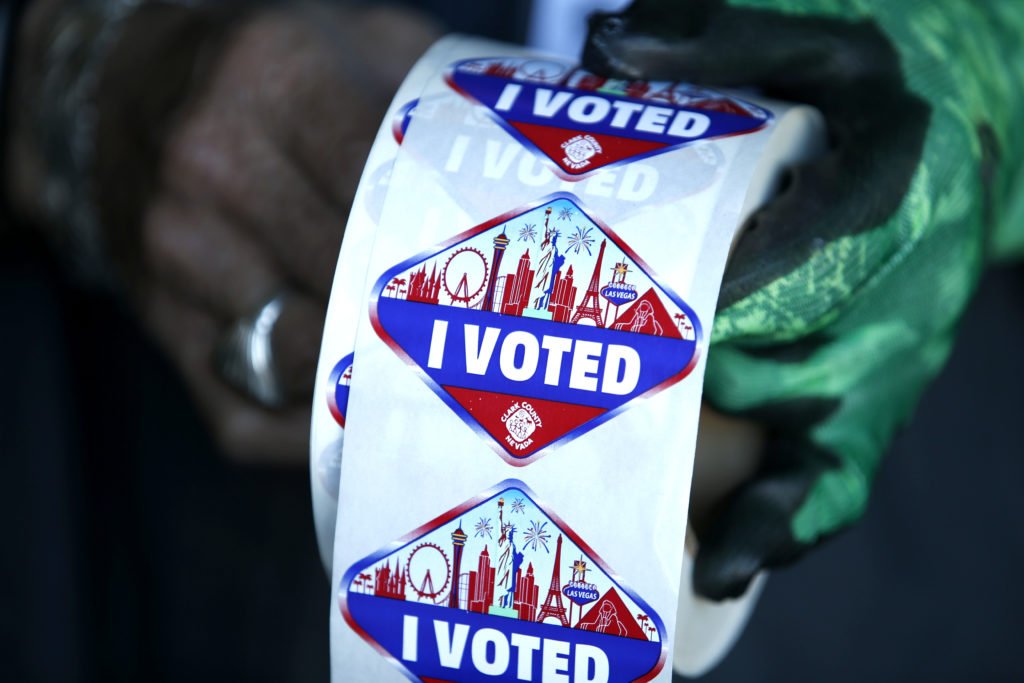
Five Democrats have qualified to run for Congress in the Second Congressional District. The list of qualified candidates includes James Averhart, State Rep. Napoleon Bracy, State Rep. Jeremy Gray, Phyllis Harvey-Hall, and Willie J. Lenard. James Averhart is a retired U.S. Marine, who ran previously in CD1 against Jerry Carl in 2020. He lives in Mobile. “The American citizenry deserves and expects more of its leadership,” Averhart said. “We should no longer settle for those who continue to promulgate untruths and spew divisive rhetoric. We deserve leadership who will extol the truth and hold in high regard a united nation.” Napoleon Bracy is a long-time State Representative representing Prichard – one of the poorest major cities in Alabama. Bracy works for Austal USA. “We are taking this thing to Congress,” Bracy said. “This district is made up of so many cities, communities, and neighborhoods just like the one I grew up in—places hurting with high poverty and crime rates, unemployment that just doesn’t have a lot of opportunities, some of it is because they’ve been overlooked. This gives us an opportunity to finally have a seat at the table and get the things we deserve.” Jeremy Gray represents Lee and Russell Counties in the Alabama House of Representatives. “It’s time for a new generation of leadership to bend the arc of justice,” Gray said. “Because the American Dream should be a promise, not a privilege.” “For too many in Alabama, working hard simply isn’t enough to keep food on the table and a roof over our heads,” Gray said. “Our community needs leadership so that we have opportunities not just to get by but to thrive. “For too many in Alabama, working hard simply isn’t enough to keep food on the table and a roof over our heads. Our community needs leadership so that we have opportunities not just to get by but to thrive. That’s why I’m excited to announce that I’m running for Congress – to give voice to these challenges in Washington and to find solutions that will improve the lives of everyone in our community.” “Growing up in Opelika, I was raised in a small house by a single mother and my grandma,” Gray continued. “We lived paycheck to paycheck. But in my Grandma’s house, we made space for everyone. On the football field, I learned the value of teamwork. In the Alabama State House, I fought for the most vulnerable among us.” Gray is the House Minority Whip. Phyllis Harvey-Hall ran for the Second Congressional District in 2022 and 2020, losing both times to Barry Moore (R). Hall is a career educator with both bachelor’s and advanced degrees, “It’s time that Alabama’s 2nd district has a leader that will represent them and bring communities together,” said Harvey-Hall on Facebook. “It’s time for Alabama to have a leader that will fight for everyone to have a better quality of life.” Willie J. Lenard is much less known at this point. He has qualified but has not yet released a statement or started a campaign website. We will have more details in the coming days. State Sens. Kirk Hatcher and Merika Coleman have talked about running but, to this point, have not qualified with the Alabama Democratic Party. Friday is the last day to qualify with either major party. The primary is on March 5. The eventual winner of the Democratic party nomination will face the Republican nominee a year from now in the November election. To connect with the author of this story or to comment, email brandonmreporter@gmail.com.


